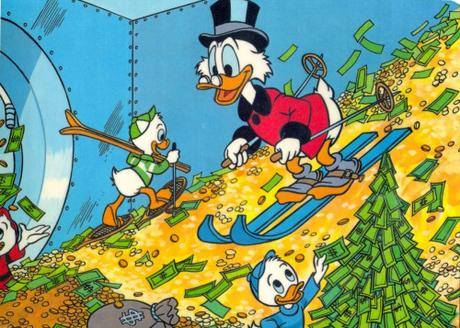The single biggest fallacy in Randianism is the notion that the great industrialists of the past succeeded by their own genius. They didn’t; every single one got wealthy due to crony deals with politicians, “officially”-granted monopolies, protectionist laws, subsidies, etc; in other words fascism, not the free market. I’m an agorist; I believe all human interactions should be voluntary exchanges, and that nobody has a right to insert themselves into others’ voluntary arrangements. But crony capitalism warps markets with collectivist violence, making them evil. Let’s take one modern example, far more subtle than bailouts, subsidies or “regulations” so complex it takes a full-time legal department (such as big companies have and small ones don’t): the copyright scam. Basic copyright is a good concept; it allows creative people to make a living from their creations. Without it, nobody could afford to be a full-time creator because the unscrupulous would constantly be stealing their work. But look at how collusion between government and giant media corporations (especially Disney) have warped this good concept into a sick means of fascist corporations making billions from the intellectual creations of people who have been dead for decades. Mickey Mouse and many other characters should have entered the public domain years ago, but the collectives which “own” them paid off enough Congresscritters to ensure that won’t happen, and the process will continue indefinitely until something is done about it. But what could be done? Well, If I were dictatrix, I’d set copyright at life plus 21 years, so any minor children of a creator who died young could enjoy those rights until majority. But anything longer stifles future generations from doing new things with those creations (as Disney himself did with public-domain characters created by others). I’d also bar corporations from owning copyright; only human creators (including teams of specifically-named individuals) could have that. Of course, the creator could license his creation to a company, as Charles Moulton licensed Wonder Woman to DC. But 21 years after the creator croaks? It’s all over, including the licenses. Under my system, everything John Lennon did solo (post-Beatles) would’ve come out of copyright a couple of weeks after George Harrison died in ’01, and Harrison’s work would now have only three years left. But the collective Beatles creations would still be protected until 21 years after the last Beatle shuffles off this mortal coil. Superman would’ve entered the public domain two and a half years ago, 21 years after Jerry Siegel’s death (his co-creator, Joe Shuster, died in 1992); imagine what stories new creators could soon write about him or about Batman (out of copyright this coming November in my system).
The “creative team” structure leaves a loophole, but I think it’s a sensible one that could allow a creator to care for loved ones after his death. All a creator would need to do is give equal creative credit (at the time of publication; retroactive attribution would not be allowed) to the person he wanted to protect. So if Lennon had given Yoko Ono official equal credit on all or some of his post-Beatles work, the music so credited would still be under copyright until 21 years after she croaks. A clever creator could even give equal credit to their kids on individual works (one book or album per kid, that sort of thing). And it would last until 21 years after that “co-creator” died, but there would be no such thing as collectives of investors who never even met Walt Disney profiting from his genius 52 years after his death. This wouldn’t kill companies; for example, Disney would still hold rights to all from their ’90s revival, probably for decades to come, and they’ve got plenty of money to keep licensing new characters ad infinitum. But no more resting on laurels, and no more using the power of government to stop other people from doing exactly what 19th and 20th-century creators did.
